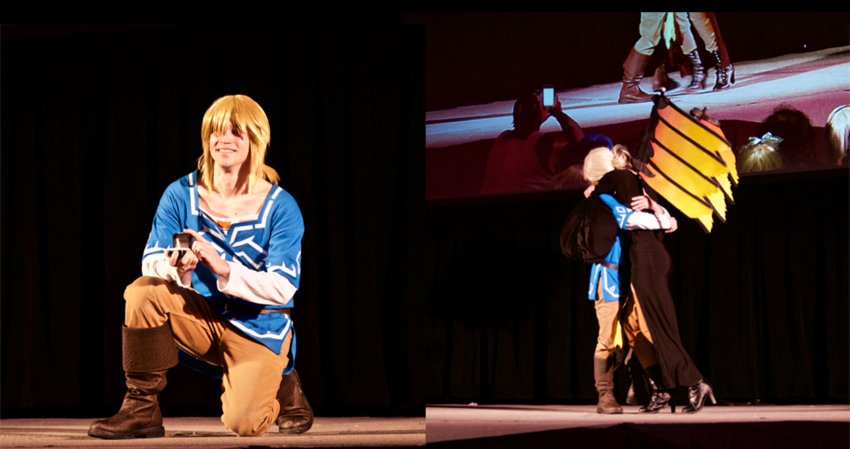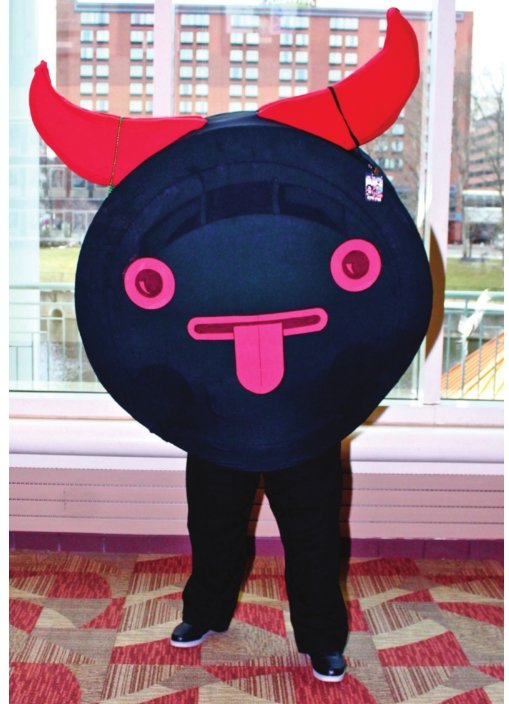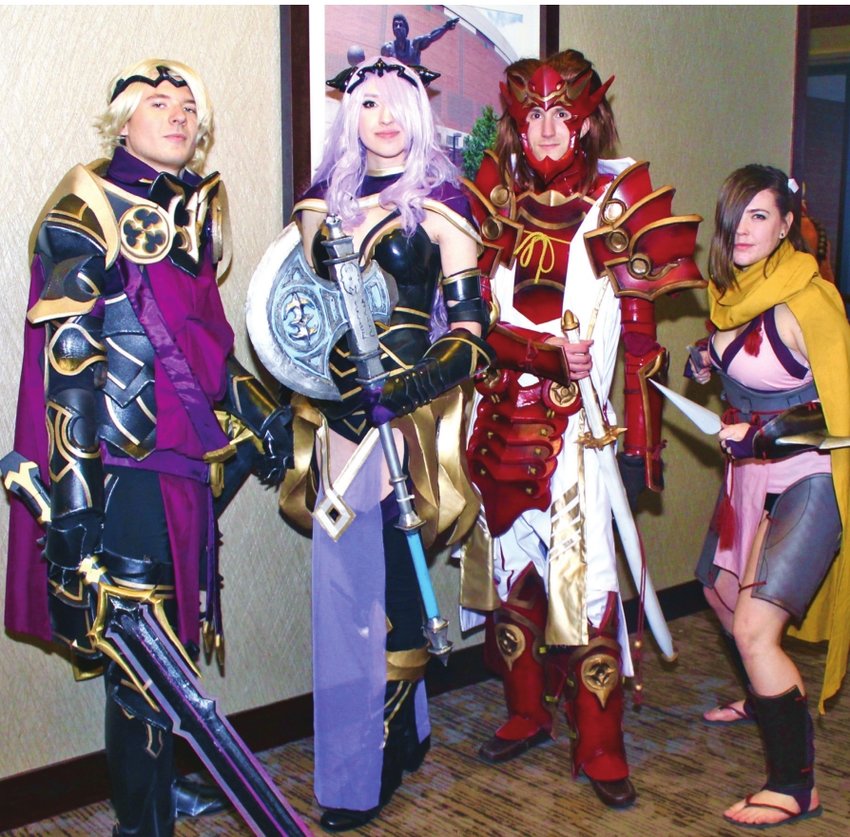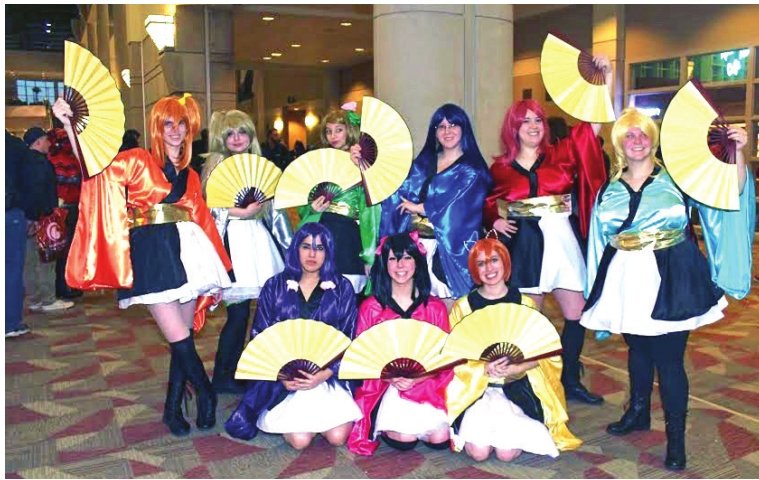
For the past seven years, a telltale sign spring has begun in Lansing is not just the blooming of trees or melting of snow, but the appearance of several thousand anime fans roaming in costumes along the city’s riverfront — to the awe, or ire, of bewildered onlookers.
“We went to the local colleges and said, ‘We’re putting on an anime convention, you guys should come!’ We expected about 300 people, and we wound up with 1,300,” Shuto Con founder Stefanie Shall said, recalling the convention’s 2011 debut. Lansing’s eighth annual Shuto Con begins Thursday at the Lansing Center.
What exactly is an anime convention? If you’re familiar with any typical gathering of comic book fans, you’re not far off. The primary difference is swapping Batman for Pikachu.
The trappings of Shuto Con include dressing in costume — in this instance known as cosplay —video game tournaments, a bustling marketplace of Japanese toys and electronics, dance parties and a variety of panelists. Essentially, it’s a three-day sensory overload for Lansing anime fans.
“I had always been interested in anime conventions, but I didn’t know there was one so close to where I live,” Shuto Con frequenter Kelsea O’Meara, 24, said. “My husband said, ‘You should go with me!’ We went and I’ve been hooked ever since.”
Conventions like Shuto Con are attractive to many because they offer opportunities for fans to meet the talent behind the anime industry. These casual interactions between fans and creators or actors aren’t as commonplace with other media and helps to make anime more of a lifestyle than merely a hobby.
Talking with congoers revealed that Shuto Con doesn’t just provide a space to geek out for a weekend. Depending on the person, Shuto Con can resonate with their deepest personal emotions. Many congoers describe their favorite anime conventions as a second home.
“It’s a little sentimental. I call Shuto Con my ‘home con.’ By way of my husband, I’ve introduced my brother and his children, and now my mother is going for the first time this year,” O’Meara said.
Anime conventions are described by certain congoers as one of few places they feel completely socially uninhibited. The masquerade like environment provides a strong social lubricant, allowing wallflowers to finally feel not so self-conscious.
“Part of it comes from the fact that we’re not appearing as ourselves. It takes away a certain measure of insecurity, because people aren’t seeing our real selves,” Shuto Con first-timer Rachel Walkowski, 20, said. “They’re seeing a character. There’s this particular feeling of contentment and gratification when somebody yells out your character’s name and gets super excited to see you.”
“I can’t just yell out to somebody on the street, ‘Hey girl with the green hair, you look so cute!’ Whereas at a con, it’s a more open atmosphere,” Walkowski added.
With a wide-open and free environment for all types of social interaction comes a feeling of unity between congoers.
“There’s always a great sense of community and a willingness to be accepted for whoever and whatever you are.
I myself became more accepting of people doing all sorts of fun stuff,” Shuto Con regular Jaime Peralez, 41, said. “As long as you’re having fun, why not enjoy yourself? That’s the spirit I feel when I’m over there. There’s a great sense of camaraderie.”
Peralez has traveled from South Dakota to attend Shuto Con with his wife Sarah Vaa since 2014, where the two find time to bond over their mutual love for cosplay and anime. Like the Peralezes, many congoers’ romantic relationships are either formed or developed at anime conventions.
When the question, “How did you meet your significant other?” gets asked on Shuto Con’s community Facebook page, there is a surprising amount of responses that answer, well, at Shuto Con. These couples explain how their chemistry developed with answers often as simple as just liking the same anime. During the cosplay contest at last year’s Shuto Con, congoer Alex Kearns proposed to his girlfriend, now Brandy Kaye Kearns, onstage before a crowd of several hundred.
For some congoers, cosplay is the only thing that matters. Many attendees will visit conventions solely to show off cosplays of their own, or to admire the work of others.
Those possessing exceptional talents with a thread and needle have even made careers out of cosplay, akin to internet celebrities that make a living off social media.
They travel from con to con seeking the sometimes lucrative top prizes from cosplay contests. Or they simply earn cash through commissions from anime fans hoping to dress to impress. “I got into cosplay after making a Halloween costume with a friend, based on a show we both liked,” avid cosplayer Kristie Good, 36, said. “Then I found out you could go to year-round conventions where there’s other people dressed up, and I was like ‘This is the best!’”
Good doesn’t select which costumes to craft solely by aesthetics, but by how strongly she relates with the character. The clothing in that regard becomes a flamboyant expression of personality and identity. While outsiders may jeer at poorly constructed outfits, of which there are often many, it’s hard to hate a homemade mecha-suit costume that appears to have stepped straight off a manga page.
“There are some people that say, ‘Oh, it’s not true cosplay if you didn’t make it yourself,’ but there’s a much larger part of the community that says, ‘Are you in costume, are you having fun? Then, yes, you’re in cosplay,’” Good said. “To me it’s all about having fun. Cosplay is for everyone, even if you can’t sew or think you’re not the right body shape, you can still cosplay. Don’t let anything stop you.”
Shuto Con has a staunch safe space policy, where nobody is allowed to make others feel uncomfortable based on any aspect of their identity, be it race, gender or sexual orientation. But Raya Ghist, a black cosplayer, 18, said there could still be improve- ment within the community.
“Despite how much we’ve grown in accepting people of different shapes and skin tones in cosplay, there’s always going to be those few that have a disdain for someone in their cosplay, because they’re not the correct height, weight or skin tone,” Ghist said. “When I cosplayed as Mercy from Overwatch, I got a lot of positivity, but there were people that said, ‘Isn’t she white? Isn’t she Caucasian? Why are you cosplaying her?’”
Shuto Con is also notable for its vendor room, where over 50 merchants from around the country trade wares. Some vendors make their living on the convention circuit, like Shawna Bourne of Geeky Endeavors. “This life is definitely not for everyone, it’s hard. From the long hours of travel to not knowing if your show will be successful and if you will have to tighten your belt for awhile,” Bourne said. “Conventions are very hit and miss, and oversaturation is a real thing. We watch the economy closely.”
The anime community was at first only an extension of Shuto Con founder Stefanie Shall’s hobbies, but with the growth of Shuto Con, it has effectively taken over her life.

But, like most that have made a career out of a passion, she’s not complaining. Her devotion is perhaps best summed up by the tattoo directly on her heart of the con’s mascot, a cartoonimp named Sumi-jaki. Shall and her staff are doing something right, as Shuto Con manages to continuously attracts thousands.
That original number of 1,300 in 2011, has since climbed to nearly 6,500 paid attendees in 2017. It’s not too unrealistic to expect that one day, especially as it draws increasing attention nationally, Shuto Con could break 10,000 — sealing its status as one of the biggest annual events in Lansing.
Shall’s love for anime conventions was developed during her college days in Jacksonville, Florida. Upon making her return to mid-Michigan, she was surprised by the lack of a similar scene up north.
“There was a convention in my area of Florida every single weekend, it was something I grew accustomed to. When I moved up to Michigan in 2009, at the time, there wasn’t a lot here, there was Youmacon in Detroit and JAFAX in Grand Rapids,” Shall explained. “I wanted something in Lansing, because there wasn’t anything in the middle ground of the state.”
After conceiving of the initial idea, Shall consulted Youmacon and JAFAX’s organizers, receiving their blessings, so long as her convention wouldn’t create a schedule conflict for potential attendees.

Shall’s experience running the anime club at her school in Florida put her in close contact with the heads of several Florida based conventions. She already had a picture in her head of how she would pull off one of her own.
“Running the club, I got to know a lot of the organizers that were putting on the events down there,” Shall said. “The leadership I learned from the club helped me out when I was starting to put together a small staff to run Shuto Con’s different departments.”
Shall’s team managed to rent out the Lansing Center and book a lineup of guests to provide the day’s entertainment without much trouble. But they found themselves caught off-guard and in a frantic environment when more than double the people they expected turned up.
“We were scrambling around the entire time, because we had no idea how to handle everything. But, it was a happy thing to happen to us, and because of that we were able to continue on each year,” Shall said.
Though Shall is the face of Shuto Con, she makes it known that the convention is an impossible feat without her employees.
“My staff have really stepped up this year by helping me handle the many aspects of the con- vention that I normally would have taken on myself,” Shall said. “I can’t thank them enough for that. We’re all dedicated to mak- ing this year great.”
Shuto Con Lansing Center 333 E. Michigan Ave., Lansing March 23-25 $60 for three day badge, one day badges start at $25 www.shutocon.com
Support City Pulse - Donate Today!
Comments
No comments on this item Please log in to comment by clicking here